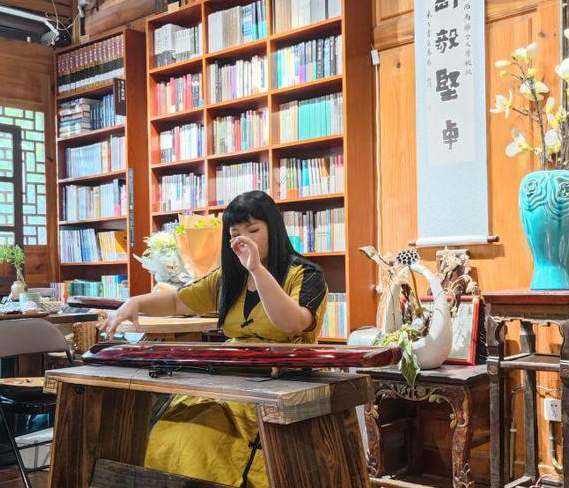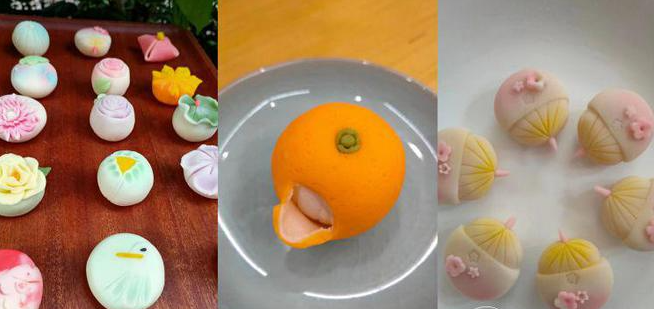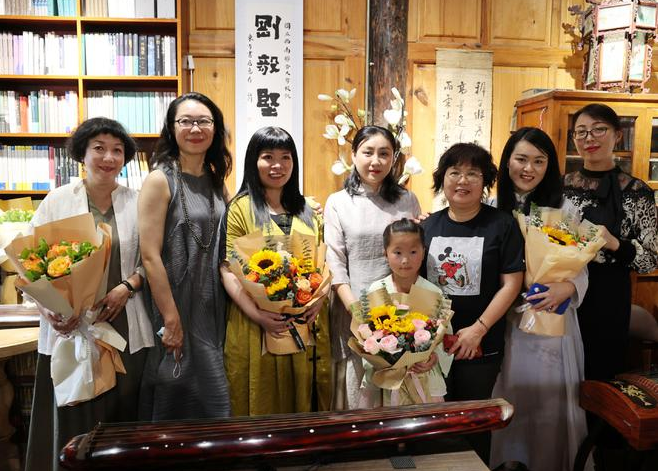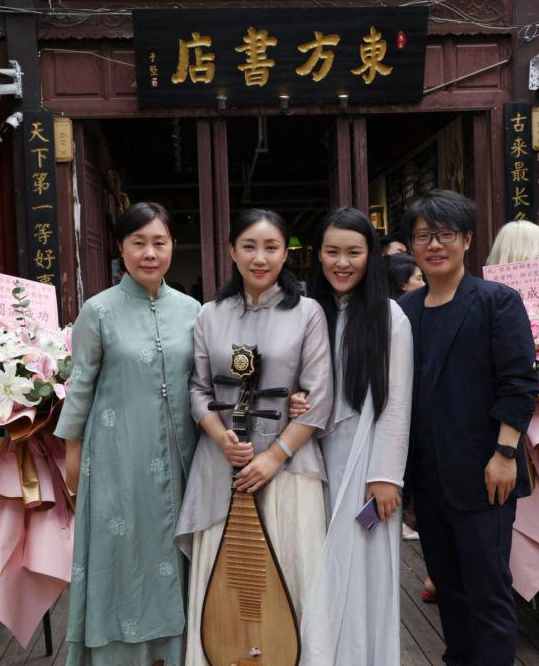A National Music Gathering of "Meeting Friends with Music" was held in the Oriental Bookstore
At 2:30 p.m. on June 3, an elegant Chinese music collection of "Meeting Friends with Music" was held at the Oriental Bookstore. The tune "Only This Green", played by pipa and guqin, opened the curtain of the elegant gathering.

On the day of the event, the Oriental Bookstore was very lively, and friends who loved Chinese music came from all over, just to listen to the sound of Chinese music and feel the charm of Chinese music. Li Guohao, the manager of Oriental Bookstore, as the host of the event, firstly introduced the background, process and three performers of the collection. Afterwards, the pipa and guqin ensemble performed "Only Green and Green", bringing the scene into a beautiful environment of "the breeze is mellow, the white clouds are curling, the mountains are green and the jade trees are there, and only green and green are left in the world".
At the end of the song, the audience applauded warmly and lastingly. Guqin player Cao Xiaomeng described the background of "Only This Green", she said: ""Only Blue and Green" became popular on the Spring Festival Gala stage, not only the music, but also Chinese music and traditional Chinese culture." On the basis of the dance drama, Cao Xiaomeng adapted the piece into an ensemble piece for pipa and guqin. The perfect combination of pipa and guqin added a lot to the piece.

Before playing "Flowing Water", Cao Xiaomeng popularized the history of the guqin for everyone. She said: "The guqin has a very important position in Chinese history. In ancient China, the guqin was a musical instrument of literati, represented by Confucius. It was so important in ancient times. In 1957, Mr. Zha Fuxi conducted a survey in the whole country, and the survey results showed that there are less than 200 people in China who can play Guqin. In 2003, Guqin applied for World Intangible Cultural Heritage".
"Pipa is the "king of plucked instruments" in our country. It originated in the Western Regions and came with the camel caravan of merchants during the "Silk Road". Before the Tang Dynasty, the name "Pipa" was a general term for all foreign plucked instruments. Also because playing forward is called "Pi" and playing backward is called "Pa", in the late Tang Dynasty, the pipa developed from oblique playing to vertical playing, and the right hand played from "pluck" to "ten fingers". Yisu Wanna recounted the history of the pipa on the spot, and played the pipa martial art "House of Flying Daggers", so that everyone could experience the high-pitched and passionate sense of heroism in Bai Juyi's "Pipa Xing", "the big strings are noisy like a torrential rain", as well as the use of The pipa song "Spring River, Flowers and Moon Night" demonstrates the delicate, agile and grainy sound effects of "small strings cut like whispers, big beads and small beads falling on a jade plate". Afterwards, Yisuwana played the pipa solo "Give Me a Rose", which was adapted from Xinjiang folk song. The warm and cheerful melody instantly enlivened the atmosphere of the scene.
Halfway through the gathering, pipa player Yisu Wanna and guzheng player Yao Yunxia presented the popular song "Flowers Are Beautiful in the Full Moon and Night", and Yao Yunxia's guzheng solo "Yunshui Zen Heart". And Cao Xiaomeng's guqin solo "Li Sao" was used as the finale piece for the Dragon Boat Festival. She introduced: "If there are two kinds of art in the world that can directly touch the heart, one is poetry and the other is music. Qu Yuan's long poem "Li Sao" and Mr. Guan Pinghu's music "Li Sao" complement each other. They are poets and musicians. The family, country and the world, which were written together, are light on one piece of paper and one piece of voiceless music, bearing the weight of thousands of years. If the Dragon Boat Festival does not play "Li Sao", then Qu Yuan will be very aggrieved."

In addition to the music, the fruit maker Yuan Yuan also made tea fruit for everyone on the spot, and invited guests to taste the tea fruit. Each tea fruit is a work of art, beautifully crafted, rich in patterns and delicate and delicious. Tea fruit originated in the Tang Dynasty. It is a cake eaten with tea in a tea banquet. It is also called tea fruit, fruit, and Tang fruit. Tang Guozi is a representative work of Tang culture and art. It belongs to traditional folk art and has a high appreciation value. For thousands of years, our country has closely integrated Tang Guozi with culture and national spirit.

It is reported that Yisu Wanna, the pipa player in this elegant gathering, is a senior teacher of the Kunming Youth Activity Center, a senior judge of the National Social Arts Examination Evaluation Committee, and a member of the 14th Kunming CPPCC. In the practice of music education outside school for more than 20 years, he has compiled and published the textbook "Twenty Lessons of Guzheng for Children" for children, and the picture book teaching aid "Guzheng Takes You to Roam the Poetry Country". Guqin player Cao Xiaomeng is a teacher of Southwest Forestry University, a researcher of the Chinese Guqin Culture Research Association, a member of the Guqin Society of the International Musicians Federation, and a researcher of the Yunnan Poetry, Calligraphy and Painting Research Association. He has been invited to Milan, Italy, Lausanne, Switzerland, France Lassburg and other cities held guqin solo concerts and guqin academic lectures, and achieved great success. They were interviewed and reported by well-known media at home and abroad such as Chinese Toutiao, European Toutiao, China Overseas Chinese Network, COZE, DNA, etc., which caused strong repercussions. Among them, the guzheng player Yao Yunxia is a guzheng enthusiast. According to her own ridicule: "I am not skilled and bold, and dare to perform on the same stage with two professional performers. With the careful guidance and encouragement of Teacher Xiaomeng, she began to work hard and study hard, just for this elegant gathering."
The Oriental Bookstore, as the venue of this elegant gathering, not only made the guests feel the artistic conception of "exhibiting books adds elegance, and the fragrance of books is better than the fragrance of rice", but also the combination of Chinese music and old wooden buildings, let everyone truly experience the "sounds that surround the beams". "beauty of. According to reports, Oriental Bookstore was founded in 1926 by Mr. Wang Sishun, a native of Kunming and a student of Mr. Hu Shi. The original site was rebuilt on June 16, 2018. At the beginning of its establishment, the bookstore exclusively sold progressive books, which were very popular among readers. Nie Er, who was across the street, often went to the bookstore to read and buy books, and asked the bookstore to order progressive books and periodicals. During the Anti-Japanese War, the bookstore also sold old and new books, and had close contacts with teachers and students of the Southwest Associated University. Wen Yiduo, Li Gongpu, Wang Zengqi and others frequented it, becoming one of the ideological and cultural exchanges at that time. After the restoration of the original site, the Oriental Bookstore has intensively held cultural salons, where reading and light meals are integrated, and it has its own large study room that is warm and comfortable.

 渝公网安备 50010702504639号
渝公网安备 50010702504639号